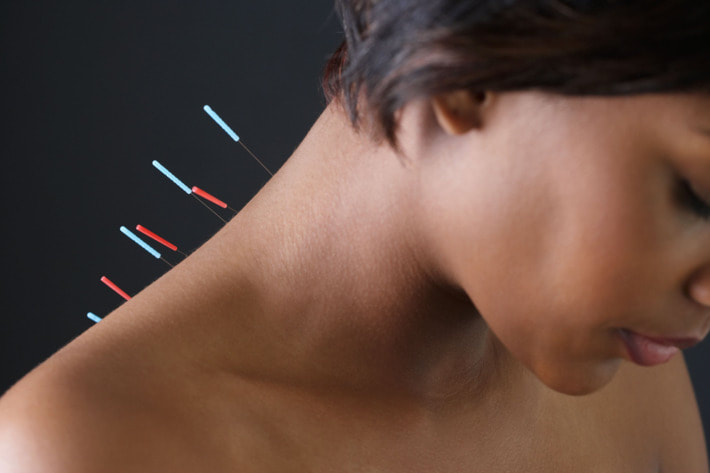|
According to the American Pain Society, most patients who undergo surgical procedures experience acute postoperative pain, yet less than half report adequate postoperative pain relief. Along with the American Society of Anesthesiologists, they released a report stating that optimal postoperative pain management begins in the preoperative period, and that a multimodal health approach is ideal for minimizing postoperative pain. One recommended modality that has been proven to have a significant effect on postoperative pain is acupuncture. Acupuncture is proven effectiveA systematic review of randomized controlled trials published in 2008 was performed to quantitatively evaluate the efficacy of acupuncture as an adjunct analgesic for acute postoperative pain management. Fifteen high quality studies were accepted for review. Results showed that acupuncture yielded a statistically significant decrease in the postoperative use of opioid analgesics, as well as a statistically significant decrease in postoperative pain intensity. The acupuncture group also reported a significantly lower rate of opioid related side effects, including nausea, dizziness, pruritis, sedation, and urinary retention. (4) Another systematic review of randomized controlled trials published in 2008 was performed to evaluate the efficacy of perioperative auricular acupuncture for postoperative pain control. Nine high quality studies were accepted for analysis. Eight of the nine randomized controlled trials found that auricular acupuncture is effective for reducing postoperative pain. Specifically, auricular acupuncture treatment was associated with a decrease in pain intensity, a decrease in the use of opioid analgesics, and an improvement in standard pulmonary function tests. (5) A third and more recent systematic review of randomized controlled trials was published in 2016, also evaluating the efficacy of acupuncture in treating postoperative pain. Thirteen high quality studies were accepted for analysis. Results showed that patients treated with acupuncture had less pain and lower use of opioid analgesics on Day 1 after surgery than those in control groups. (8) A different type of study published in 2001 researched the hypothesis that the use of acupuncture during surgery could decrease the amount of anesthesia utilized. Researchers noted that the analgesic drugs used for anesthesia are both expensive and associated with negative side effects such as nausea, vomiting, drowsiness, pruritis, and respiratory depression. Intradermal acupuncture was performed during surgery on 107 patients undergoing upper abdominal surgery and 82 patients undergoing lower abdominal surgery. Results showed that acupuncture increased the fraction of patients with good pain relief from the recovery room to the second postoperative day and reduced analgesic requirements by up to 50%. Additionally, the recovery team noted that there were no secondary complications from the acupuncture noted in any of the patients, such as infection or pain at the insertion site. (3) Links to these studies and more may be found in the Resources & related links section below. How acupuncture worksAcupuncture yields multiple biological responses, related to the stimulation of sensory neurons that connect to structures within the central nervous system. This leads to activation of pathways affecting various physiological systems in the brain as well as in the periphery. Effects of this include a decrease in inflammation both generally and locally, as well as modulation of circulation in the area being treated. Acupuncture has also been shown to influence the release of naturally occurring pain relievers within the body, including endogenous opioids and endorphins. All of this results in a decrease in pain. Acupuncture's effects are also associated with stimulation of the parasympathetic nervous system. Many people are familiar with the sympathetic nervous system, which controls our "fight or flight" response. The parasympathetic nervous system is paired with the sympathetic nervous system, and has the effect of clearing out stress hormones and re-allocating the body's resources towards digesting and healing. It is associated with improved activity of the immune system, as well as a greater sense of calm and well being. Acupuncture treatment has also been found to activate the hypothalamus and the pituitary glands, resulting in a broad spectrum of systemic effects that support general homeostasis. Learn moreTo learn more about acupuncture and how it works, take a look at About Acupuncture or How Acupuncture Works. To learn more about the differences between Eastern and Western medicine, you can read About Eastern Medicine. To learn more about the Wisdom Traditions Acupuncture clinic, read About Us or Our Philosophy. If you have any additional questions, you can browse our FAQ or Contact Us. We're happy to answer any questions you may have. You can also Schedule an Appointment online. Resources & related links
1 Comment
|
AuthorMarni Adhikari, M.Ac, L.Ac, Dipl.Ac, is the founder and acupuncturist at Wisdom Traditions Acupuncture of Essex Junction, VT Learn MoreQuestions? |


 RSS Feed
RSS Feed
